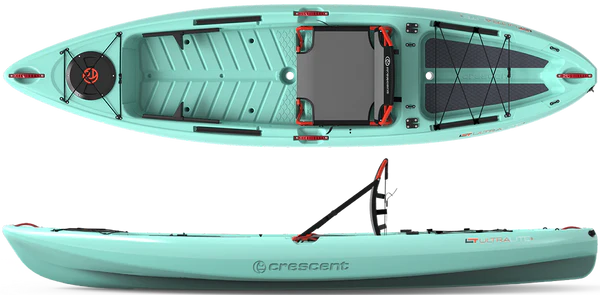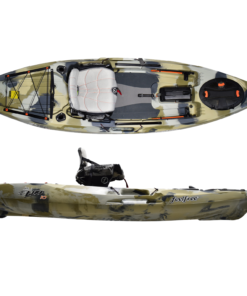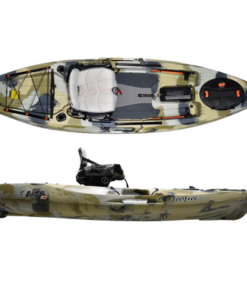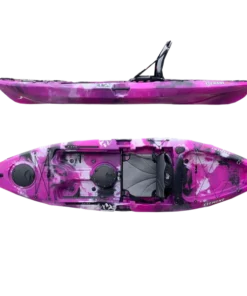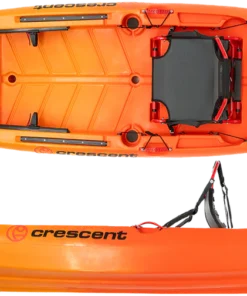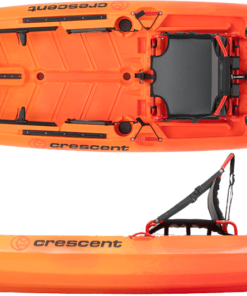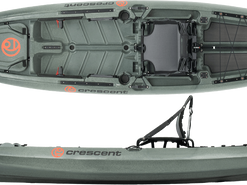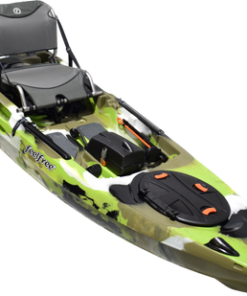Kayaks A Complete Guide to Enjoying the Water
Kayaking has become one of the most popular outdoor activities for nature lovers, adventure seekers, and fitness enthusiasts. Whether you’re paddling down a serene lake, navigating fast-moving rapids, or fishing in coastal waters, kayaking offers a fun and challenging way to explore the water. In this guide, we’ll explore everything there is to know about kayaking, from the types of kayaks available to essential safety tips and the best destinations for kayaking adventures.
What is Kayaking?
Kayaking is a water-based activity where individuals or groups paddle a small, narrow boat called a kayak using a double-bladed paddle. Kayaks come in various designs to suit different water conditions and purposes, from whitewater rapids to flatwater lakes and oceans. The activity can be enjoyed recreationally or competitively, making it accessible to all skill levels.
Types of Kayaks Choosing the Right Kayaks for Your Adventure
Kayaks are designed for specific water conditions and activities. Here are the main types of kayaks to consider:
1. Sit-On-Top Kayaks
Sit-on-top kayaks are popular among beginners because of their stability and ease of use. As the name suggests, the paddler sits on top of the kayak, providing more freedom of movement. These kayaks are often used for recreational paddling in calm waters.
2. Sit-In Kayaks
Sit-in kayaks have a cockpit where the paddler sits inside the kayak. This design is more suitable for colder water environments since it provides more protection from the elements. Sit-in kayaks offer better control and efficiency, especially for longer trips or rougher waters.
3. Touring Kayaks
Touring kayaks are designed for long-distance paddling, offering greater speed and stability in open water. They are typically longer than recreational kayaks and are equipped with more storage for extended trips.
4. Whitewater Kayaks
Whitewater kayaks are specifically built for fast-moving rivers and rapids. These kayaks are shorter and more maneuverable, allowing paddlers to navigate quickly through turbulent waters. They also come in different designs for various levels of rapids.
5. Fishing Kayaks
Fishing kayaks are outfitted with specialized features such as rod holders, extra storage, and even pedal systems for hands-free movement. They offer great stability for anglers who need to stand while casting or reeling in fish.
Essential Kayaking Gear What You Need for a Safe and Fun Experience
Before heading out on the water, it’s important to be properly equipped. Here’s a list of essential kayaking gear to ensure a safe and enjoyable experience:
1. Kayak
Obviously, the most crucial piece of equipment is the kayak itself. Choose a kayak that suits your skill level and the type of water you’ll be paddling in. As we’ve covered, there are different types for different uses.
2. Paddle
A lightweight paddle is essential for maneuvering your kayak. The length of the paddle should match your height and the width of your kayak. Beginners should start with a standard paddle, while more experienced kayakers might opt for carbon-fiber paddles for better performance.
3. Personal Flotation Device (PFD)
Safety should always come first. A Personal Flotation Device (PFD), or life jacket, is mandatory when kayaking. Choose a PFD that is specifically designed for kayaking, allowing for maximum movement while paddling.
4. Dry Bags
Dry bags are used to store your belongings, such as phones, snacks, and extra clothes, keeping them dry while you’re on the water. These bags are waterproof and come in various sizes.
5. Spray Skirt
A spray skirt is a flexible covering that fits around the cockpit of a sit-in kayak to keep water out. It’s especially useful in rough water or during colder weather conditions.
6. Helmet and Protective Gear
For whitewater kayaking, a helmet is essential to protect your head from impacts with rocks and other obstacles. You might also need protective gear like elbow and knee pads for added safety.
Health Benefits of Kayaking A Full-Body Workout
Kayaking is not only a great way to explore the outdoors but also offers a range of health benefits. It engages several muscle groups and provides both aerobic and strength training.
1. Cardiovascular Fitness
Paddling consistently helps improve cardiovascular endurance. Kayaking is an excellent aerobic exercise that can increase your heart rate and improve your overall cardiovascular health.
2. Upper Body Strength
Kayaking primarily works your arms, shoulders, and back. The repetitive motion of paddling strengthens these muscle groups over time, leading to improved upper body strength.
3. Core Strength and Stability
Maintaining balance in a kayak engages your core muscles, especially the abdominal muscles and obliques. As you paddle and navigate through different water conditions, your core plays a critical role in maintaining stability.
4. Mental Health and Stress Relief
Being on the water, surrounded by nature, can significantly reduce stress and promote mental well-being. Many kayakers find the rhythmic motion of paddling to be meditative, providing an escape from daily stressors.
Kayaking Safety Tips How to Stay Safe on the Water
While kayaking is generally safe, especially in calm waters, it’s important to follow some essential safety guidelines to ensure a fun and secure experience.
1. Always Wear a PFD
No matter your skill level or the type of water you’re paddling in, always wear a properly fitted Personal Flotation Device (PFD). It can save your life in case of an accident or capsizing.
2. Check Weather Conditions
Before heading out, always check the weather forecast. Avoid kayaking in stormy or windy conditions, as these can create dangerous water environments. If you’re kayaking on a river, be sure to check water levels and currents.
3. Use Proper Paddling Techniques
Using the correct paddling technique can prevent fatigue and reduce the risk of injury. Make sure to use your core muscles, rather than just your arms, when paddling to conserve energy and improve efficiency.
4. Know How to Rescue Yourself
Practice self-rescue techniques, such as the Eskimo roll or wet exit, in case you capsize. It’s essential to be able to get back into your kayak or swim to shore in an emergency.
5. Kayak with a Buddy
Kayaking with a partner can increase safety. If you’re a beginner, it’s especially helpful to kayak with someone more experienced who can guide you and provide assistance if needed.
Best Kayaking Destinations Around the World
If you’re an adventurous paddler looking for new places to explore, here are some of the best kayaking destinations around the world:
1. Milford Sound, New Zealand
Milford Sound offers breathtaking views of towering cliffs, waterfalls, and lush rainforests. Paddling through this fjord gives you a chance to experience New Zealand’s natural beauty up close.
2. Norway’s Fjords
The fjords of Norway, including Geirangerfjord and Sognefjord, are iconic kayaking destinations. Paddle between towering mountains and cascading waterfalls in one of the world’s most dramatic landscapes.
3. Lake Tahoe, USA
Located in California and Nevada, Lake Tahoe is a crystal-clear lake surrounded by mountains, offering stunning views and calm waters for leisurely paddling. It’s an ideal spot for both beginners and experienced kayakers.
4. Halong Bay, Vietnam
Halong Bay’s emerald waters and limestone islands create an otherworldly atmosphere. Kayaking in this UNESCO World Heritage Site lets you explore hidden caves and secluded beaches.
Why Kayaking is the Perfect Outdoor Activity
Kayaking is a versatile and rewarding outdoor activity that offers something for everyone. Whether you’re looking for an adrenaline-pumping whitewater adventure, a peaceful paddle through calm waters, or a great way to stay fit, kayaking delivers. With the right gear, safety precautions, and a spirit of adventure, you can enjoy the beauty of nature and the thrill of exploration on the water.
Kayaks
Kayaks
Kayaks



